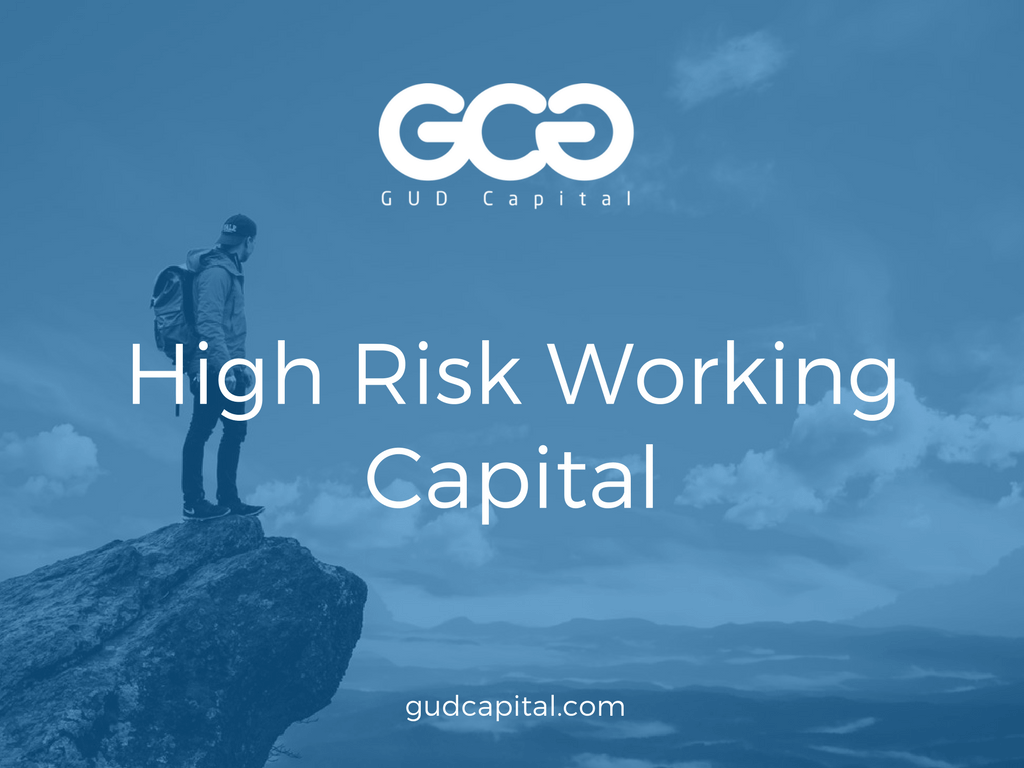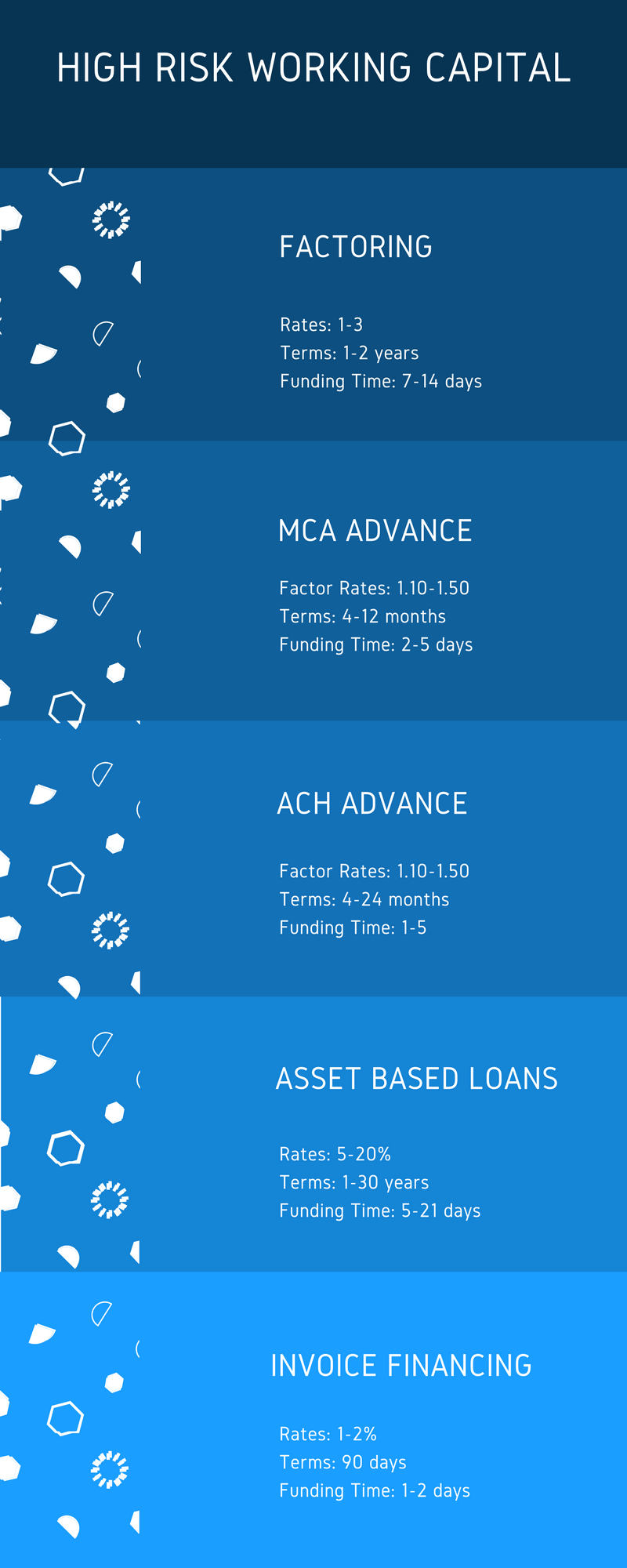High-Risk Operating Capital
Having enough money to cover your expenses is priority number 1 for every business. Being able to keep the operations running – not just running, but running smoothly – is a key to having a successful and profitable small business. Lack of access to sufficient working capital is essential for most companies. But if you’re a small business that has had some blemishes on your credit in the past, you may find yourself locked-out of more conventional working capital sources. Business owners with less than 700 FICO scores may find it impossible to get a working capital loan from a bank or credit union. So where to go? What are the options for small business owners in need of working capital, but who are considered “high-risk” to many lenders? In this article we will look at all the financing options for business owners who are high-risk because of bad credit.

What is High Risk Working Capital?
Usually, high risk working capital is simply working capital loans and advances provided to small business owners who have bad credit, or had a credit experience in the past that has caused a negative action on their credit report. But a business owner may be viewed as high risk even if they have fantastic credit. Some other high-risk causes may come from:
- Tax Liens: Business that have substantial amounts of money owed to the Internal Revenue Service may be deemed “high-risk” because if the government decides to collect, and they’ve placed a lien on the business assets, they will be able to collect before the lender of funder is able to. Therefore, since the lender will subordinate to the IRS, the lender may find itself with no recourse should the borrower liquidate.
- Outstanding and Late Accounts Receivables: If a lender sees that you have 90 or longer account payables owed to vendors and suppliers, they may deem the small business as high-risk of default. Fact is, if the business owes substantial financial obligations to others, they may just be holding on by a thread, and at increased risk of not paying the lender back.
- Overleveraged: If a borrower consistently has financial obligations that are more than they are bringing in from normal business operations and sales, many lenders could deem the borrower to be overleveraged. As noted above, any business that is overleveraged is at risk of defaulting on their loan.
- Stacked Loans: If a small business has a number of loans or stacked merchant cash advances, lenders will see them as an increased risk. Why? Because if a borrower has stacked a previous lender, they very well stack another cash advance – which will put prior advance companies at risk of not being paid back. The more loans a merchant stacks, the more cash-flow is eaten up by daily payments.
- Industry: some industries are considered higher-risk because of the nature of the business, and the way they are paid by their clients and customers. Construction companies and general contractors are considered higher risk because they are job dependent, and if one contract falls through the construction company or contractor may find themselves without access to money to payback the lender for months. Other high-risk industries include: Brokers, Auto dealers, Accountants, Lawyers, Sole proprietors, Home-based businesses.

Advantages of High Risk Working Capital Loans
- Availability: Having access to any working capital may be a godsend for small businesses locked-out of conventional lending sources. High risk working capital lenders (such as fintech lenders, mid-prime lenders, subprime lenders, and merchant cash advance suppliers) simply offer financing that other lenders won’t. While conventional lenders will require credit scores of 700 or more, a high-risk funding company may have credit requirements of 500 or lower.
- Speed: Another huge advantage of a high-risk business loan as compared to a traditional business loan is the speed in which an applicant can apply and get funded. Within an hour of submitting your application, these lenders and funding companies can approve you for a loan, and you could be funded within days – sometimes even the same day.
- Ease: Whereas a bank will require substantial documentation, a high-risk business lender may just require an application and proof of cash-flow (business bank statements) to approve you for funding.
Disadvantages of High Risk Working Capital Loans
- High Rates: Since the lenders and funders of high-risk working capital loans are taking increased risk, they will price that risk into the funding facility to protect themselves from hurting their balance sheets. Banks take next to no risk, and that’s why they’re able to provide such low rates to borrowers. But since high-risk lenders are often dealing with default rates as high as 20%, they have to price their loans and advances in a way that allows them to be profitable.
- Short Terms: High Risk lenders don’t want to be left holding the back, thus: they offer much shorter terms than conventional lenders provide. High risk lenders terms are rarely calculated in years, but instead using months. At most, the high-risk lender will offer three-year terms, but that’s a rarity. Most often, high-risk working capital have terms that range from 4-18 months. Some of the repayment options include monthly payments, but most of the time repayment is made weekly, if not daily.
- Expensive Fees: While a conventional bank may just charge fees of a couple of percentage points, a high-risk lender may charge substantial fees. In fact, its common for a high-risk funding company to charge rates as high as 10% of the total loan amount.
Summary
High-risk business loans have their pros and cons, and may not be for every business. In the end, the small business owner must ask themselves if the price of capital worth it? Will it increase revenues? Will it help with paying the employees? Can you do without the high-rate financing? If you conclude that you must get the high-rate capital and you also need help obtaining the capital, please reach-out to one of our working capital specialists, and we’ll help you get the right financing for your company.




















